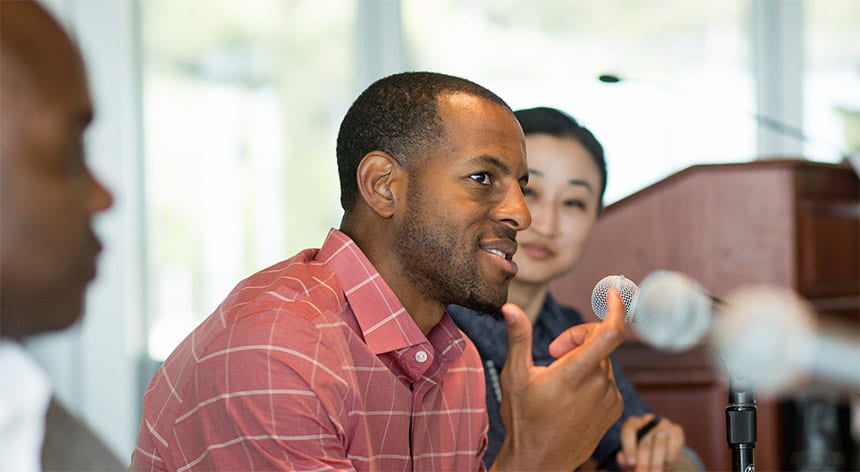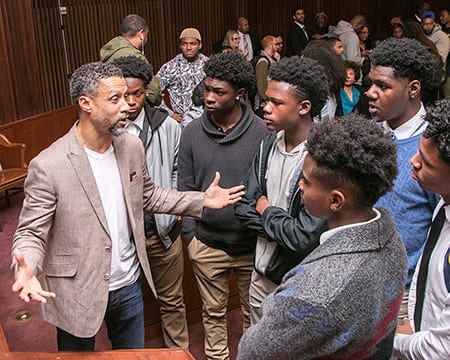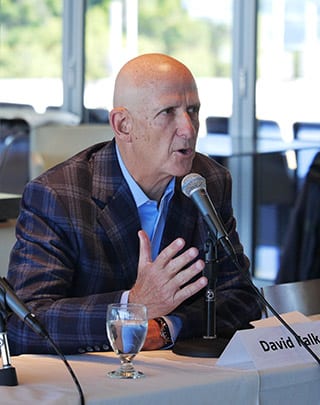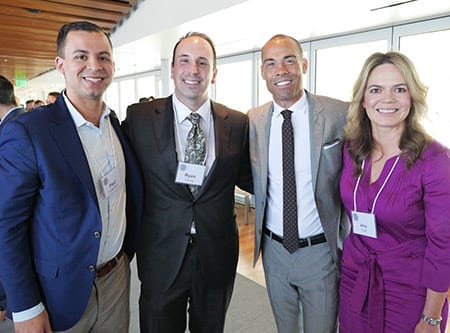
By Andrew Cohen
For many, working in sports seems like an escapist fantasy. But as the A-list panelists at Berkeley Law’s Sports & Society Conference April 13-14 made clear, success on the field—and in the field—is rigorous work.
The gathering addressed the business of sports, strategic planning by Bay Area teams, labor issues and pro franchises. It ended with a discussion about athletes becoming venture capitalists featuring Good Counsel Agency founder Rudy Cline-Thomas and Andre Iguadola—Golden State Warriors forward and most valuable player of the 2015 NBA Finals.
The third annual conference was truly a team effort, co-sponsored by the Berkeley Journal of Entertainment & Sports Law; the Berkeley Center for Law and Business; the Berkeley Center for Law & Technology; the UC Berkeley Division of Equity & Inclusion; and the Haas Sports Business Club.

Before a full house inside Booth Auditorium, the conference began with a riveting panel entitled “Voice of the People: Athletes, Race, and Activism in Our Changing Times.”
Former San Francisco 49ers quarterback Colin Kaepernick, who became a lightning rod after kneeling for the national anthem last season in protest of police killings of unarmed black men, was scheduled to be a surprise panelist. Although he had to cancel at the 11th hour, another panelist was abundantly qualified to speak on Kaepernick’s ordeal.
In 1996, Mahmoud Abdul-Rauf (formerly Chris Jackson, the third overall selection in the 1990 NBA draft) was a dynamic scorer for the Denver Nuggets and one of the league’s top free-throw shooters. Like Kaepernick, he viewed the American flag as a symbol of oppression and racism—and felt that standing for the anthem would conflict with his Muslim faith.
For a time, his actions during the anthem—stretching or staying inside the locker room—went unnoticed. But when a reporter asked him about it, his life changed forever.
The NBA suspended Abdul-Rauf for one game, citing a rule that players must line up in a “dignified posture” for the anthem. A compromise was reached, allowing him to stand and pray with his head down during the anthem. But at the end of the season—after Abdul-Rauf led his team in points and assists—the Nuggets traded him. Two years later, when his contract expired, no NBA team gave him a tryout.
Kaepernick, who led the 49ers to the Super Bowl in early 2013, started for the team last year. He is now on the open market, but has yet to draw interest from another team.
“What Colin is going through doesn’t surprise me in the least,” Abdul-Rauf said. “It’s identical to what happened to me. Death threats, the assassination of one’s character … It’s sad in this day and age where we have this freedom to voice what we believe, but when we exercise that freedom and say what’s not comfortable for people to hear, it’s not taken very well—especially by people in power.”
Authentic advocacy
Fellow panelist Layshia Clarendon, a WNBA player who led the Cal women’s basketball team to the 2013 NCAA Final Four, writes op-eds, magazine articles, and social media posts advocating for equality. Still, she finds that “my biggest form of resistance is simply existing as my authentic self in a world trying to erase my various identities as a gay, black, non-gender conforming woman.”

Clarendon touted the importance of black athletes using their platform to speak out on race and other social issues, but wondered “why people are always look for us to be activists but don’t ask predominantly white leagues like Major League Baseball or the NHL. Yes, black athletes have a responsibility, but we’re not the only ones.
Lamenting that society “looks at racism, sexism, homophobia, and patriarchy in silos,” Clarendon insisted that, “they’re interwoven and systematic.” She also pointed out the racial disparity in pro basketball, which has a vast majority of white coaches and a vast majority of black players.
Dr. Albert Bimper, senior associate athletic director for diversity and inclusion at Colorado State—the only such position in the country—is a former NFL player who won a Super Bowl with the Indianapolis Colts in 2006. Bimper encourages student-athletes to “think of activism as sustained engagement to build a level of knowledge, create a platform and leverage that platform wisely.”
As for Kaepernick, Abdul-Rauf expects the quarterback’s plight to mirror his own.
“Huey Newton wrote that once you decide to take an activist approach, in some respects you’re a doomed man,” said Abdul-Rauf, who played in various countries after his NBA career ended abruptly. “Kaepernick is raising awareness and donating money to important causes and doing great things. Isn’t this the kind of guy you want on your team? Players are getting arrested for assault and battery and drug charges, but teams are quick to bring those guys back. It’s amazing.”
Sports entertainment
The conference also tackled how the sports industry consists of an intricate network of much more than just teams and leagues. Speakers on one panel explained how a growing industry of businesses intersect to produce sports entertainment.
“There’s no such thing as a sports lawyer, only lawyers who have sports entities as clients,” said Carlos Kuri, general counsel at Red Bull, whose work involves Major League Soccer’s New York Red Bulls.
Kuri, GoPro legal counsel Brett Hirsch, PAC-12 Conference general counsel Woody Dixon, and Los Angeles 2024 Olympic Bid general counsel Brian Nelson described the process of piecing together a revenue jigsaw puzzle from television deals, ticket sales, merchandise, sponsorships, and stadium naming rights.
They also closely track how the tech revolution influences public consumption of sports. “The days of watching a full live game on TV may be dwindling,” Dixon acknowledged. “People are consuming games and sports information in so many ways with social media, live streaming, and other outlets. How do you deliver everything that fans want without starting to cannibalize your own content?”
Bay Area teams

Legal leaders of three Bay Area pro teams offered insight into their jobs’ unexpected challenges and myriad priorities.
When the Warriors move from Oakland’s Oracle Arena to San Francisco’s Chase Center for the 2019-20 season, they will transition from tenants to landlords. “That means a big shift from 41 home basketball games a year to more than 100 overall events,” said Warriors’ assistant general counsel Paul Fenstermaker.
Amy Tovar, vide president and deputy general counsel of the San Francisco Giants, described a litany of challenges from real estate dealings to corporate licensing. “There are so many facets to working with a sports team,” she said. “It’s not at all what I assumed a legal sports job would be.”
Oakland Athletics Assistant General Counsel Ryan Horning received booming applause for stating the team’s commitment to stay in Oakland. “We have to a build an operation that truly works for the community,” he said. “We’re soliciting a ton of feedback to figure out how to best lift the East Bay.”
All three panelists expressed disappointment in the Oakland Raiders’ recent decision to move their franchise to Las Vegas. “It’s a unique market,” Fenstermaker said. “Tourism is obviously a huge industry there, but I’m not sure what they’ll find in terms of local season ticket holders or home-field advantage.”